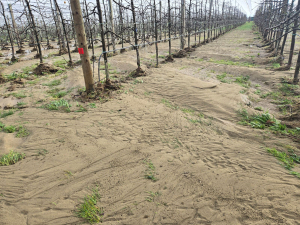Santa's present for the primary sector - an FTA with India
Primary sector leaders have welcomed the announcement of a Free Trade Agreement between India and New Zealand.
 Kate Scott there are reports that some growers have lost substantial areas of land that has just been swept away by the Motueka River. Photo Credit: HortNZ
Kate Scott there are reports that some growers have lost substantial areas of land that has just been swept away by the Motueka River. Photo Credit: HortNZ
HortNZ's CEO, Kate Scott says they are starting to see the substantial cumulative effects on their members of the two disastrous flood events in the Nelson Tasman region.
She says the latest event just a few days ago resulted in significantly more impact not just in different areas but for additional growers and says the damage from this event was significantly worse.
She says there are reports that some growers have lost substantial areas of land that has just been swept away by the Motueka River.
"The sort of things we are seeing is a lot of silt and debris damage and what we are seeing is that it is not just the orchards and orchard structure that are affected. We are seeing sheds, houses, cool stores, packhouse and worker accommodation also damaged. To add to the problem adjacent infrastructure such as roads, bridges and stop banks have also suffered as a result of the disaster," she says.
Scott says while there is never a good time for such an event to occur, the fact that it wasn't at the key harvest time was somewhat of a blessing. But, she adds that the impacts of the floods are a bit of an unknown and it may be weeks, months and perhaps years until these are known.
She says orchardists and growers from Hawke's Bay which was hit by Cyclone Gabrielle have been very forthcoming in sharing their knowledge on how to deal with a similar situation.
"They learned ways of dealing with trees that were lying in degrees of water and silt and the risk of root rot and this knowledge will give Nelson Tasman growers the best shot at dealing with the crisis they are facing," she says.
While HortNZ is not the lead agency dealing with the recovery operation, Scott says they are playing a facilitation role, supporting growers and speaking to government on almost a daily basis to ensure they are fully aware of the extent of the crisis in the region.
She says they also have experienced staff on the ground in the region assessing local needs and making sure that growers have access to the range of services that can offer them help.
She, like others, believe it will take month and probably years before the region recovers from this disaster.
A New Zealand dairy industry leader believes the free trade deal announced with India delivers wins for the sector.
The Coalition Government will need the support of at least one opposition party to ratify the free trade deal with India.
Primary sector leaders have welcomed the announcement of a Free Trade Agreement between India and New Zealand.
At Pāmu’s Kepler Farm in Manapouri, mating has wrapped up at the across-breed Beef Progeny Test.
More than 150 people turned up at Parliament recently to celebrate the 20th anniversary of Horticulture New Zealand (HortNZ).
Biosecurity New Zealand says Kiwis should continue to keep an eye out for yellow-legged hornets (Vespa velutina) over the holiday season.